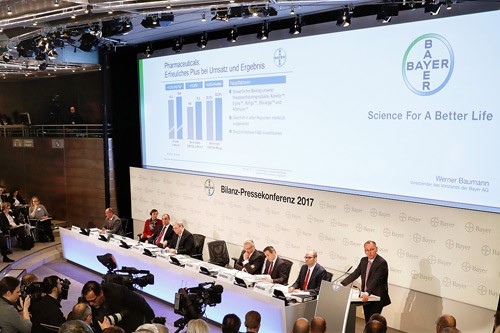
Bayer turned in a strong performance in 2016, with pharmaceutical sales that rose 7.3% to €16.4bn driven by high growth from Xarelto and Eylea.
Anticoagulant Xarelto (rivaroxaban) led the charge, rising 30% to bring in €2.9bn, with eye treatment Eylea (aflibercept) up 32% with sales of €1.6bn.
The two products accounted for around 28% of Bayer’s total pharma sales last year and are regarded as key growth products for the firm, along with its cancer drugs Xofigo and Stivarga and pulmonary hypertension treatment Adempas.
Between them the five products posted sales of €5.4bn in 2016, although Xarelto and Eylea dominated the pack, accounting for 83% of those combined sales.
Last year Xofigo (radium-223 dichloride) brought in €331m (up 29%) and Adempas (riociguat) rose 40% to rack up revenues of €254m, but Stivargo, which treats colorectal cancer and gastrointestinal stromal tumours (GIST), struggled.
The drug was withdrawn from the German market and faced intense competition from Taiho’s two-drug oral therapy Lonsurf (trifluridine and tipiraci). Consequently its US sales plunged 22% to €142m, dragging down total sales that fell 12% €275m.
Bayer looks for Stivarga turnaround in 2017
Dieter Weinand, head of Bayer’s Pharmaceuticals division, told PMLiVE that Stivarga had been recovering last year, with quarter-on-quarter performance that was “significantly improved”.
“There was a curiosity and a willingness to try Lonsurf at launch, and what we’ve found in the US is the same thing we saw in Japan earlier, where Lonsurf is considered very well tolerated – probably better tolerated than Stivarga – but it’s also considered less efficacious.
“What has happened is that you see Lonsurf, having been tired, moving behind Stivarga and we have seen significant improvements and regained market share in the US. So we believe Stivarga will continue to regain share in the US.”
He said it would be considerably helped in this by an anticipated additional indication to treat refractory liver cancer, for which it was last month granted priority review by US regulators.
“That is what will drive Stivarga’s growth,” he said, adding that this year Bayer expects 20% growth from the treatment.
However, after having failed once to come to an agreement with German pricing authorities the company is not about to try again, and currently has no plans to reintroduce it to the market.
Elsewhere in its portfolio Bayer saw slowing sales from cancer drug Nexavar (down 2.5% to €870m), contraceptive family of Yaz, Yasmin and Yasminelle (down 4% to €678m) and multiple sclerosis treatment Betaferon/Betaseron (down 11% to €734m).
Monsanto acquisition ‘won’t curtail pharma deals’
Overall, group sales rise 1.5% to €46.8bn in 2016, in a year that saw Bayer agree in September a $66bn deal to acquire Monsanto and bolster its leadership position in agribusiness.
Last year there were suggestions an acquisition of this magnitude would leave Bayer with few resources to spare for pipeline-boosting pharma deals, but Weinand said that had been a ‘misunderstanding’ and that the company’s long-term funding plans would not be impacted by the Monsanto deal.
Bayer last year increased its pharma R&D spending by 9% to €4.7bn and, at nearly 13% of sales, this was “an all-time record for Bayer”, the company’s management board chairman Werner Baumann told journalists at a press conference in Leverkusen, Germany earlier this week.
“Bayer has a whole series of promising [pharma] product candidates currently undergoing clinical development,” he added. “The company estimates that six of them – in the mid- to late-stage pipeline – have an estimated combined peak annual sales potential of at least €6bn.”
They include five candidates in phase III trials: copanlisib for non-Hodgkin lymphoma, ODM-201 for hormone-sensitive prostate cancer, finerenone for diabetic kidney disease, vilaprisan for uterine fibroids and endriametosis and heart failure treatment vericiguat. Bayer also has high hopes for antibody drug conjugate anetumab ravtansine, which is currently in phase II trials for mesothelioma.




